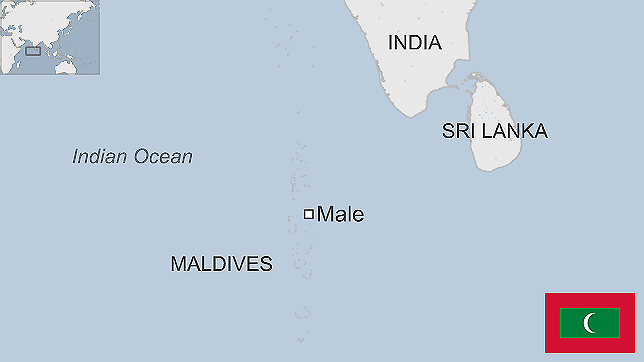Maldives election: Ibrahim Mohamed Solih claims victory
- Published
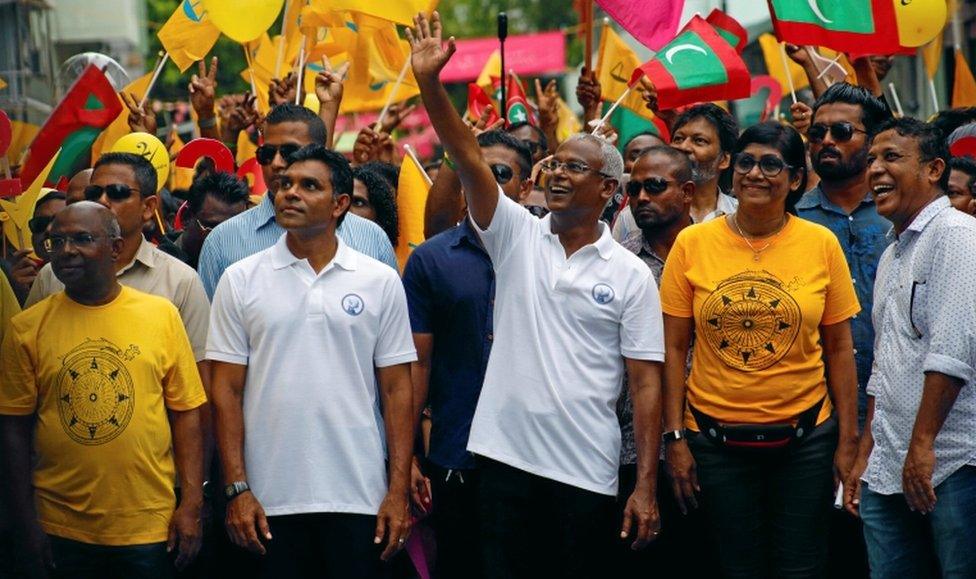
Ibrahim Mohamed Solih, the opposition candidate for the presidency, with supporters at his final campaign rally
The candidate of a united opposition front claims he has ousted the sitting president of the Maldives.
Ibrahim Mohamed Solih holds an unbeatable lead over Abdulla Yameen, with 437 of 472 ballot boxes counted, media in the Indian Ocean islands say.
But the national electoral commission has not yet announced any results.
Observers had believed the election was rigged in favour of Mr Yameen, who favours closer ties with China, while Mr Solih leans towards India.
President Yameen's government stands accused of crushing dissent.
Police raided opposition headquarters on the eve of the vote.
Mr Solih said his win was "a moment of happiness, a moment of hope" and urged a peaceful transition of power for the Indian Ocean archipelago.
He said he had won by a 16% margin over Mr Yameen, with 92% of votes counted.
The head of Mr Solih's Maldivian Democratic Party said the result would "bring the country back to the democratic path".
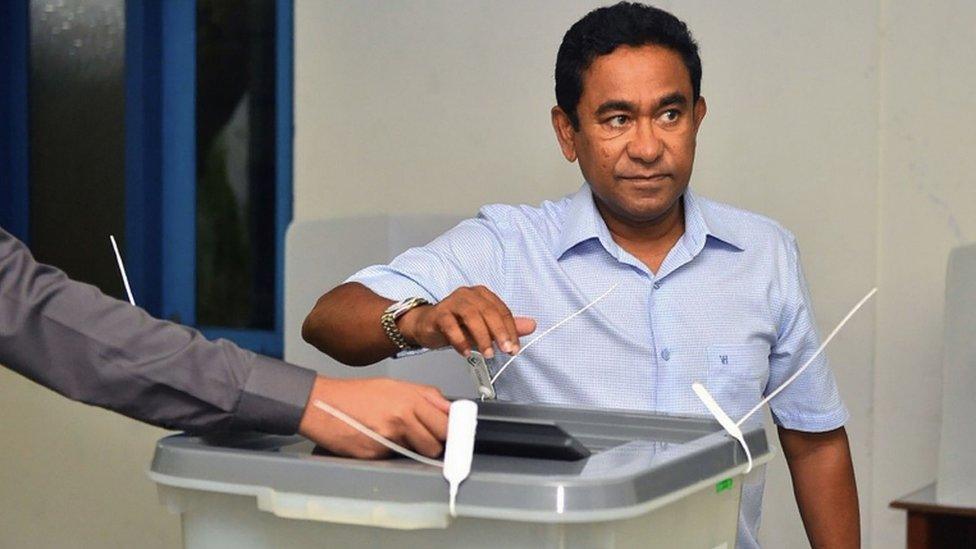
President Abdulla Yameen has voted at a polling station in the capital, Male. Rights groups have accused his government of trying to rig the election.
The European Union and US voiced concerns about the election, with both threatening to impose targeted sanctions if the democratic situation did not improve.
The Maldives is made up of 26 coral atolls and 1,192 islands, and tourism is a vital part of its economy. More than 400,000 people live there but its future hangs in the balance due to climate change.
Polls opened at 08:00 (03:00 GMT) on Sunday, and closed three hours later than expected, at 19:00, due to long queues.

Unease as results come in
By Olivia Lang, BBC News
If Abdulla Yameen hoped this election would allow him to consolidate power over the island nation, it has sorely backfired. Despite the odds, the opposition appears to have pulled off a decisive win.
When the provisional results came in, Mr Solih was quick to claim victory and call for a peaceful transfer of power. Mr Yameen, on the other hand, met the results with silence.
In the streets of Male, there is cautious jubilation from opposition supporters, but also unease. They do not trust the president to concede without a fight. And as the wait grows longer, that unease will only spread.

What's the situation in the Maldives?
The archipelago has been gripped by political upheaval in recent years. In February the Supreme Court quashed the convictions of nine opposition figures, among them exiled ex-President Mohamed Nasheed, who was ousted from office in 2012.
But after President Yameen declared a state of emergency and ordered the arrest of two judges, the court reversed its decision.
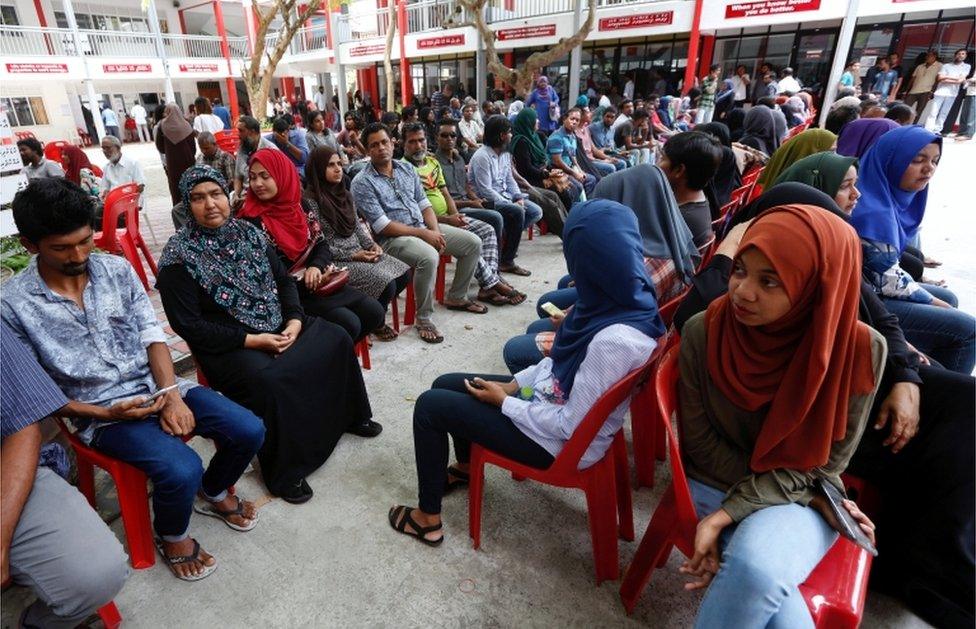
Maldivians wait in line to cast their votes
The move was seen as a sign that Mr Yameen - who is seeking to win another five-year term - would not tolerate any challenge to his rule and sparked criticism from Washington, London and New Delhi.
Some in India, meanwhile, called for an intervention in a small, neighbouring country once seen as firmly within its sphere of influence. Mr Nasheed also appealed for Indian military intervention.
What does China have to do with this?
As part of Beijing's push to gain strategic influence and carve out new trading routes in the Indian Ocean and beyond, it has lent billions for huge infrastructural projects in Pakistan and Sri Lanka, and operates key ports in those countries, to the chagrin of India.
Under Mr Yameen, the Maldives has also welcomed Chinese money for major projects and signed a free trade agreement. More tourists from China now visit the Maldives than from any other country.
Analysts say that Beijing fears any change in government that could affect its interests, while India is concerned about Mr Yameen's cosy ties with its regional rival.
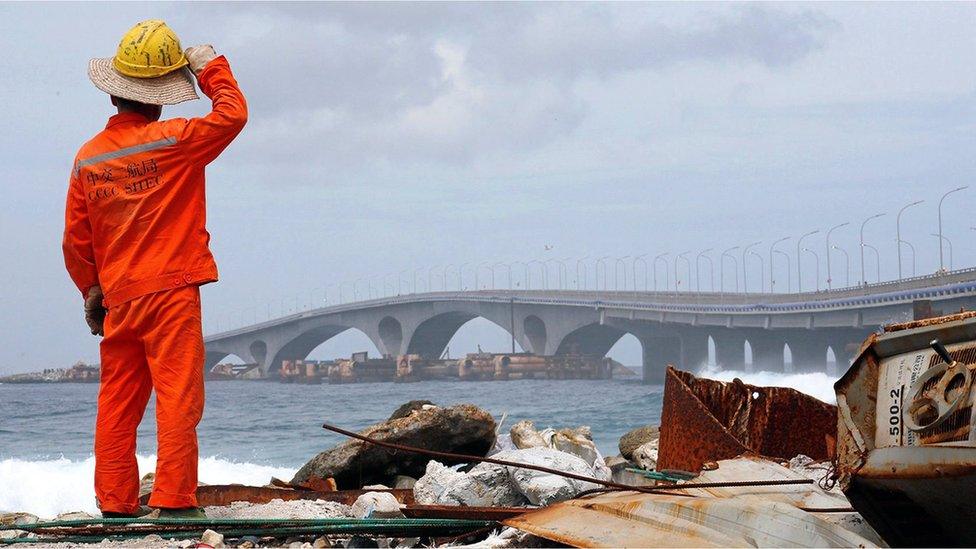
The Sinamale bridge, funded with Chinese grants and loans, connects the capital Male and the airport island Hulhule
"India sees it all in a very securitised sense that here are all these Chinese-backed ports around it," said Gareth Price, a South Asia expert at the think-tank Chatham House, referring to Pakistan and Sri Lanka.
Delhi thus sees China's lavishing of loans on the Maldives as part of a wider strategic ambition to secure another foothold in the Indian Ocean, he added.
Was it a fair election?
International monitors have been barred from the country for the election, and very few foreign media have been allowed in.
On Saturday, police officers searched the opposition Maldivian Democratic Party office in Male without a warrant, the party said. A police spokesperson confirmed the raid to the BBC, without providing further details.
The commission's spokesman said allegations of possible voter fraud "don't have any basis in reality" and that the vote counting process has not changed.
Mr Yameen has shrugged off accusations of authoritarianism, saying during the campaign: "No-one will come to greet me and shake my hand, if there is tyranny."
His half-brother, Maumoon Abdul Gayoom, ran the country autocratically for three decades until the archipelago's first-ever democratic vote in 2008, which was won by Mr Nasheed. Mr Gayoom was jailed in June.
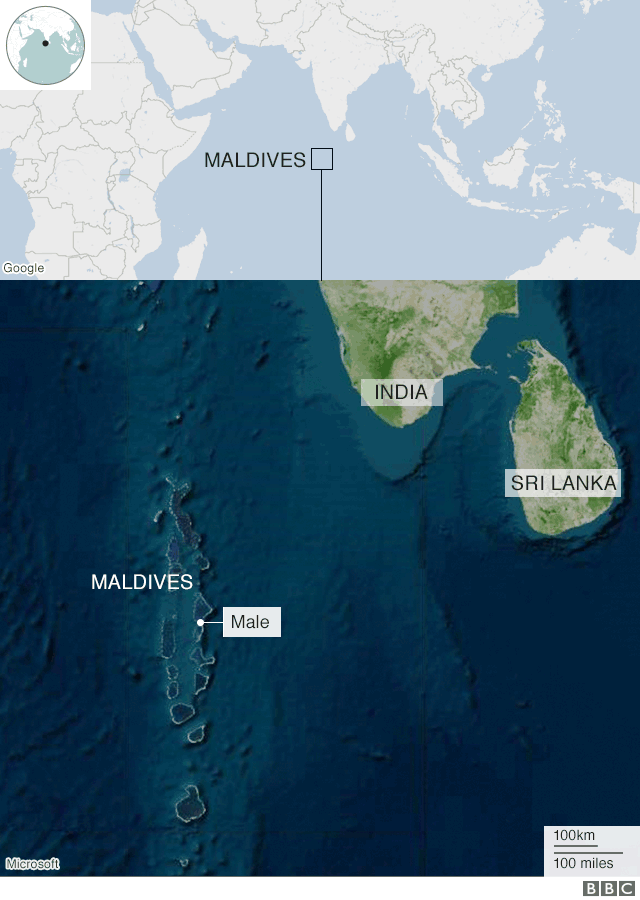

- Published7 February 2018
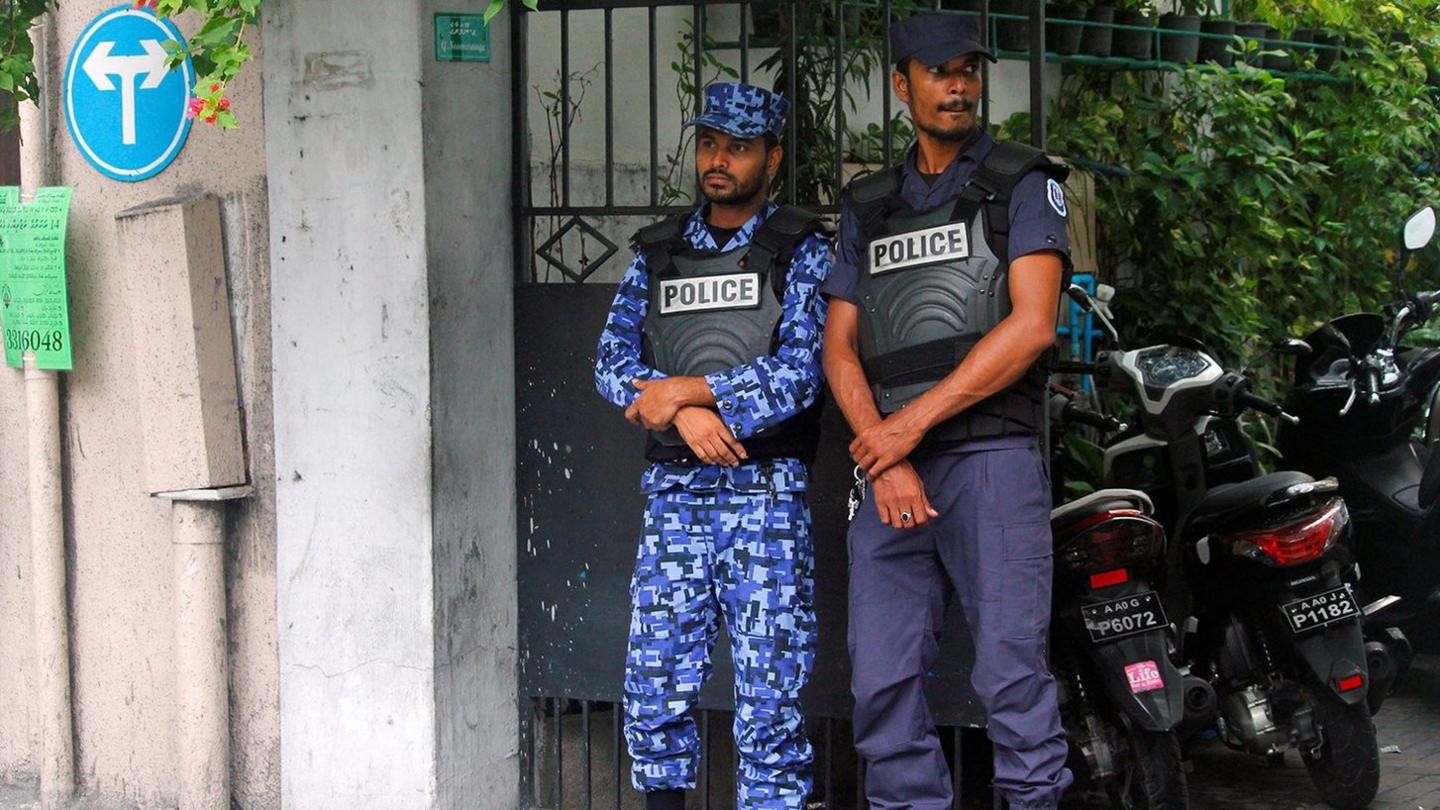
- Published5 February 2018
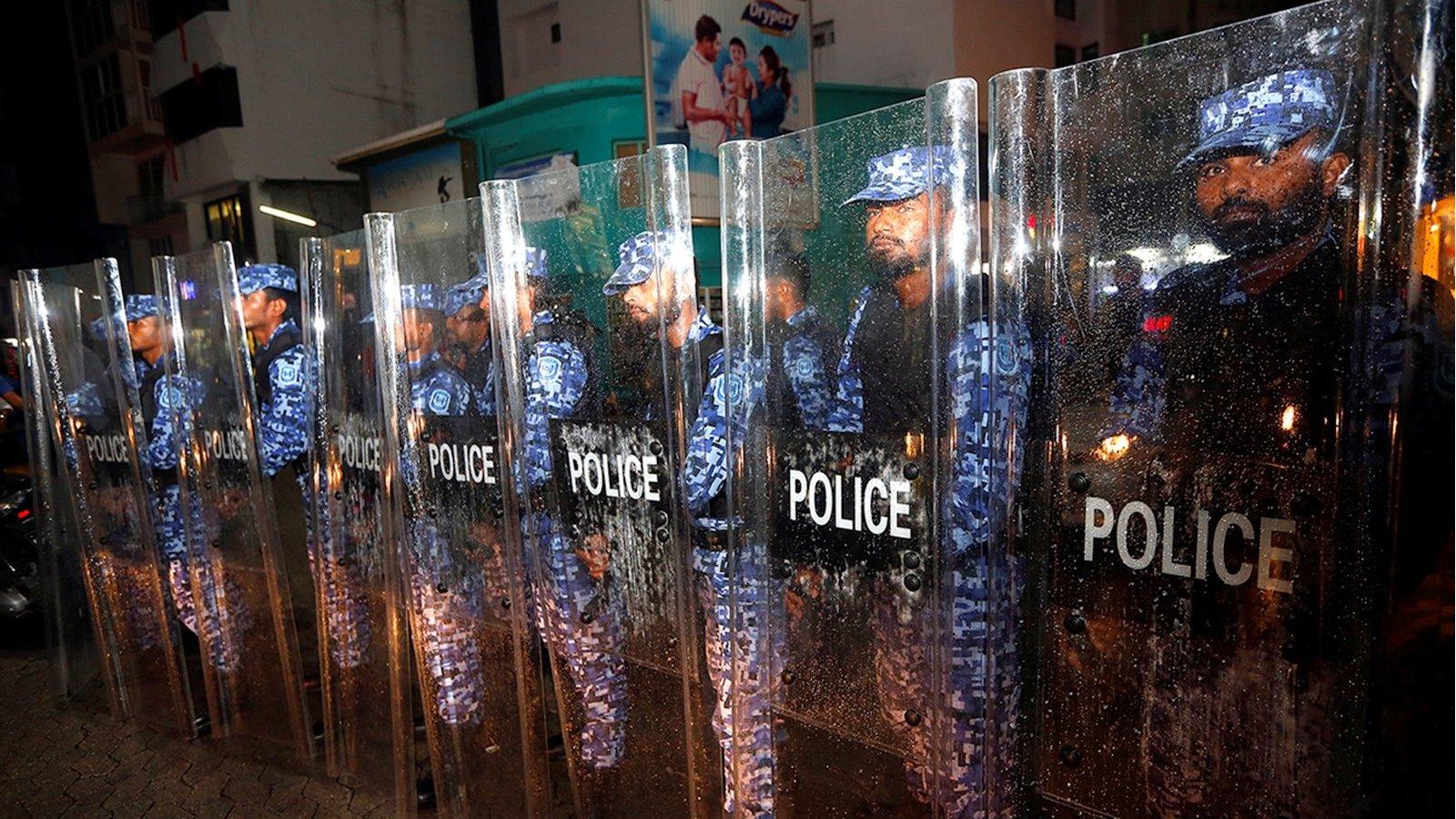
- Published10 August 2017
- Published10 March
